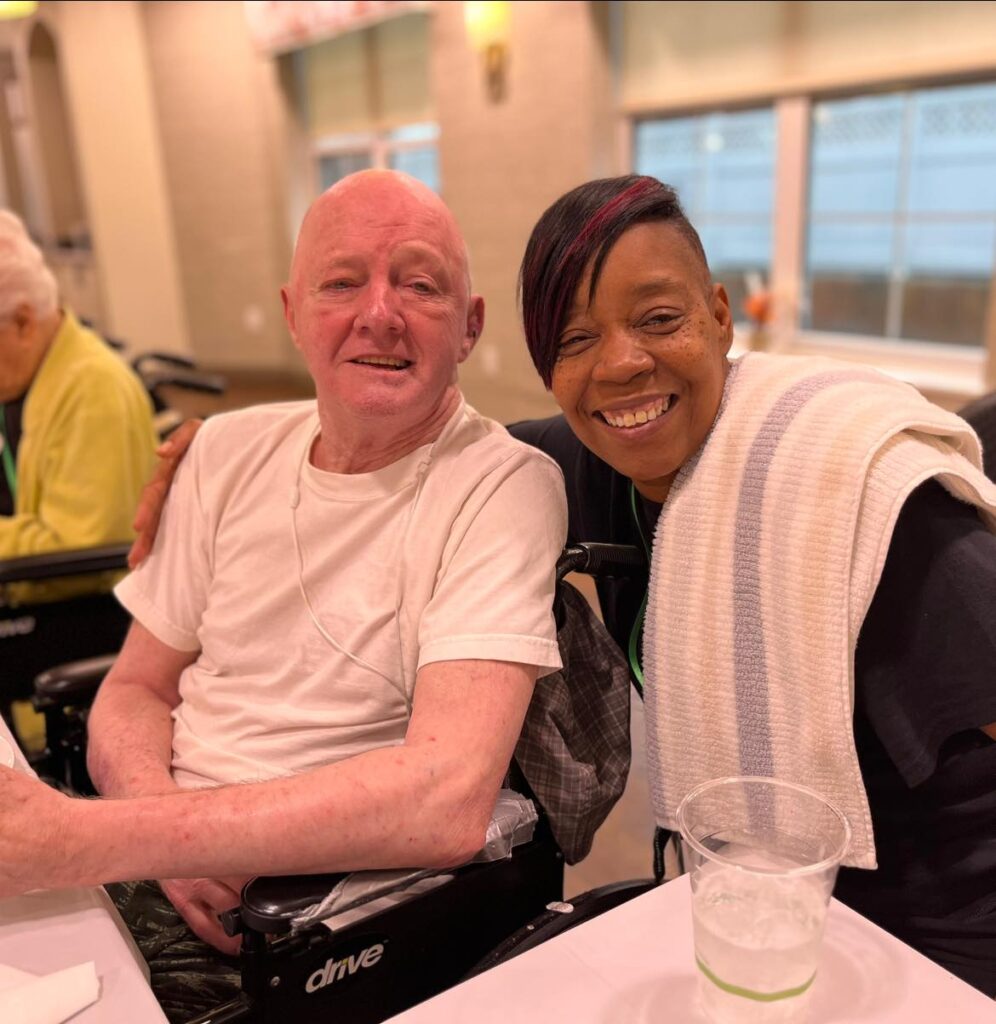Knowing when you or your loved one is ready for memory care can be challenging. You and/or your loved one are comfortable at home, but you’re noticing that the help at home isn’t cutting it. You might wonder, “When should someone with dementia go into a care home, and when is care at home enough?”
The short answer is it depends.
The longer answer is that often a person will move to a care home because doing so helps them receive the right level of care, care that they couldn’t otherwise receive in their own home.
But many factors influence the decision to move to a care community. We’re here to explain those factors to make your life easier when navigating the various stages of dementia with your loved one.
For more than 20 years, our experts at Village Green have helped families, caregivers, and residents make quality care decisions for their health needs. If you’re looking for the answer to when someone with dementia should try more extensive care like memory care in a memory care neighborhood, you’ve come to the right place.
In this article, we’ll discuss:
- When a person with dementia can stay at home
- How caregivers can support someone with dementia while the person lives at home
- Potential issues that can arise if a person with dementia lives at home versus in a memory care neighborhood
- What to consider when deciding between home care and a memory care neighborhood/community
- Tips for helping someone with dementia as they navigate the transition to a care facility or neighborhood
5 Signs that living at home may no longer be an option
| 1. The person with dementia can’t do daily tasks — like eating or grooming — without the help of another person. 2. The person doesn’t feel safe at home because they continue to fall or can’t climb stairs as well. 3. An unexpected life event or change occurs, for example, a person’s caregiver becoming ill or not being able to care for the person as they did before. 4. The person with dementia finished a stay in the hospital and/or now has a health issue that can’t be managed at home and/or now needs round-the-clock care. 5. The person’s needs are more involved and time-consuming than the caregiver can provide. |
Living with dementia — while living at home
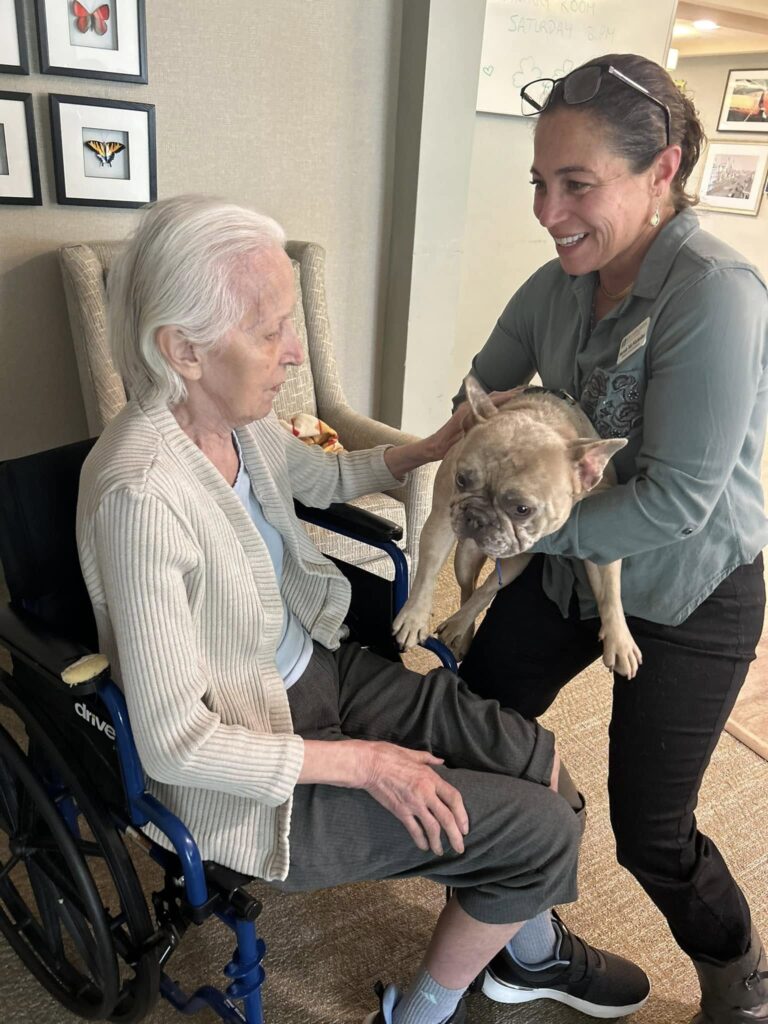
For many individuals who live with dementia and Alzheimer’s disease, staying at home versus moving to residential care is preferred. Remaining at home but with extra help can be a solid option for people with dementia.
Staying at home allows people to stay in a place that feels familiar and safe.
With that being said, you’ll want to make sure that the person is safe, healthy, and can receive the support they need if they choose to stay at home.
If your loved one with dementia has yet to take a care needs assessment, while you’re considering care in a memory care community, now is a great time to take this assessment.
Likewise, if you’re the caregiver for a person with dementia, you can also ask your trusted healthcare team for a caregiver’s assessment.
“Why a caregiver’s assessment?” You might ask. A caregiver assessment can show you what care your loved one needs and what supports are available.
What’s more, taking a caregiver assessment can give you a better idea of how to care for people with dementia, as well as how to help someone with dementia as their condition progresses.
Supporting someone with dementia while they live at home

For some individuals, assisted living or a skilled nursing care facility may not be necessary. For some individuals with dementia, their needs can be managed at home with extra help.
If you’re considering this option for you or your loved one, consider following these suggestions:
- Talk to the person with dementia and make a list together of what types of support they need. Likewise, if you’re not up to the task for some of the items on this list, make a list of what you feel would be challenging for you to manage.
- Consider possible solutions that will help you ensure the health and safety of the person under your care.
- Check with local municipalities, non-profit organizations, respite care providers, and family service organizations to help you find an option that works for you and the person with dementia.
- Consider contacting caregivers in your network to see what help is available for you and the person under your care.
- Do your best to keep an open mind before determining that no options work for you and the person with dementia.
- If after trying the above solutions you still find you have concerns, you may want to consider whether the person could benefit from living in a memory care neighborhood or care facility.
Issues that can arise if people with dementia live at home
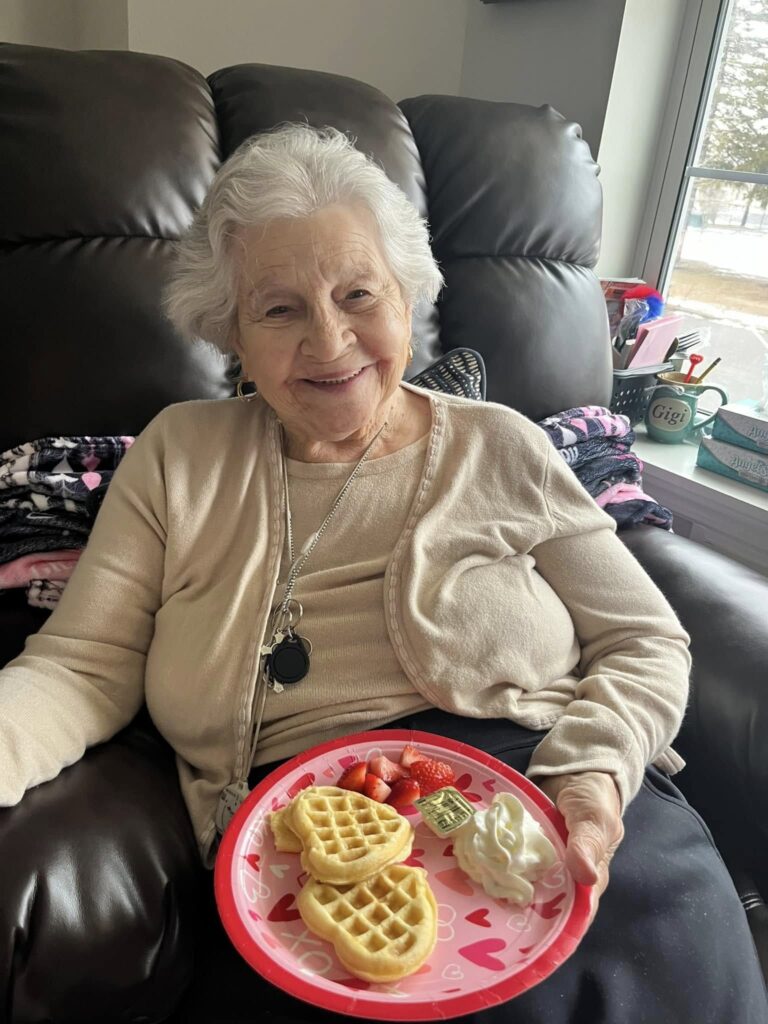
If you decide to go with in-home care and opt out of having your loved one live in a nursing home or long-term care facility, a few issues can arise when a person with dementia lives at home.
Some of the most common issues that arise include:
- Incontinence: dementia patients often find using the restroom challenging, especially as they age. You may be called upon to help the person clean up after themselves after using the restroom.
- Feelings of aggression: A person with dementia who receives care may become agitated as a result of, for example, pain, infections, or other sensory stimulations.
- Bouts of wandering: A person with a dementia diagnosis may walk around or leave a home because of their forgetfulness. Dementia caregivers and care providers are tasked with staying vigilant for any walking or wandering that a person with dementia may experience.
- Forgetfulness around taking medication: especially for older adults receiving senior care or other professional care from an in-home caregiver, caregivers will need to include medication management as part of their daily tasks.
- Trouble with eating and drinking: Eating and drinking is often very challenging for individuals with dementia
- Safety concerns related to memory loss: Forgetting to turn oven burners off, falling over on stairs, and turning off faucets are commonplace for those with severe dementia. Your loved one may need extra supervision to stay safe in their homes.
As part of safeguarding the health and safety of a person with dementia, you’ll want time to consider what’s in the best interest of the person under your care. If you’re caring for someone with dementia and feel you can’t provide all that the person needs to live well, you may want to bring them to a memory care neighborhood where they can receive round-the-clock, dedicated care.
Professional care staff teams in memory care facilities are licensed and trained to provide specialized care using the latest technology and healthcare best practices for people with dementia. Deciding to bring a person with dementia to a care facility isn’t easy.
We understand. To determine which option is best, consider creating a list of the advantages and disadvantages of both in-home care and care in a memory care facility.
If you still need help finding the right solution, consider reaching out to a dedicated senior concierge staff. Plus, we’re always a call away if you ever need an expert’s opinion or want to brainstorm ideas.
Options for deciding between home care and memory care
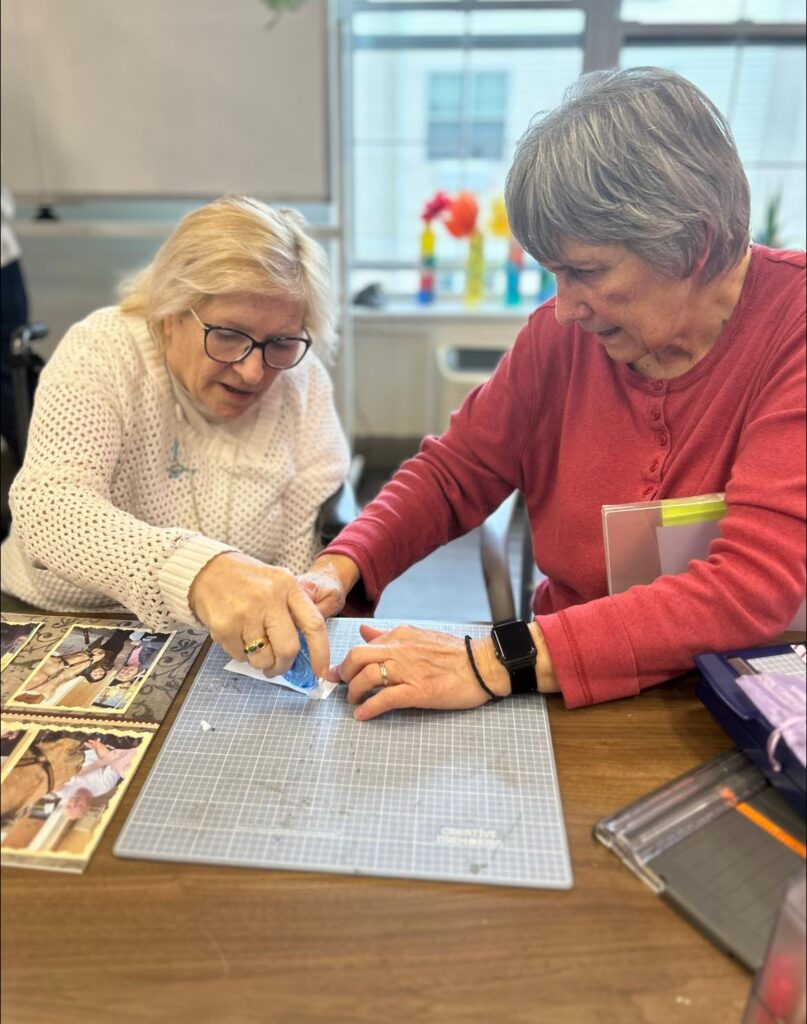
For individuals without many dementia symptoms or who don’t need a great deal of help with activities of daily living, arranging for a respite worker to support them with small tasks — like gardening or cleaning — is another option. Respite work can be helpful for people who are very independent and who need minimal support.
Also, hiring a personal assistant is an option for home care for a person in the earliest stage of dementia. Just know that personal assistants and other forms of home care can be very expensive.
Also, having a full-time professional caregiver at home can lead someone to feel confused and can affect how “home sweet home” feels to them.
The difference is night and day with care communities.
For people who need care in assisted living facilities or memory care communities, residents receive higher levels of care.
What’s more, in a memory care community, residents receive constant care (if needed) from groups of dedicated professionals of various healthcare disciplines. Best of all, if someone needs specialized care, senior concierge staff teams can arrange all the logistics as part of their commitment to their residents.
In other words, at a senior care facility and care community, seniors with dementia receive personal care that’s tailored to their unique preferences and healthcare needs. Plus, caregivers in care facilities are experienced in caring for people with different forms of dementia and providing personalized care that touches on all eight dimensions of well-being.
At the end of the day, the choice is yours. We encourage you to do your research, and continue to weigh your options to decide which care option is best for you and your loved one’s needs.
Did you know?
Did you know that many people think that Alzheimer’s and dementia are the same and use the terms interchangeably? The truth is that distinctions between the two exist.
To treat and manage both to the best of your abilities, knowing the difference between the two is helpful. Our team is dedicated to providing top-notch support, care, and programs for seniors and their families affected by dementia and Alzheimer’s.
Check out our Facebook page to see what our weekly revolving care programs and special outings for residents with dementia and Alzheimer’s look like in action.
Tips for transitioning to memory care (and care communities)
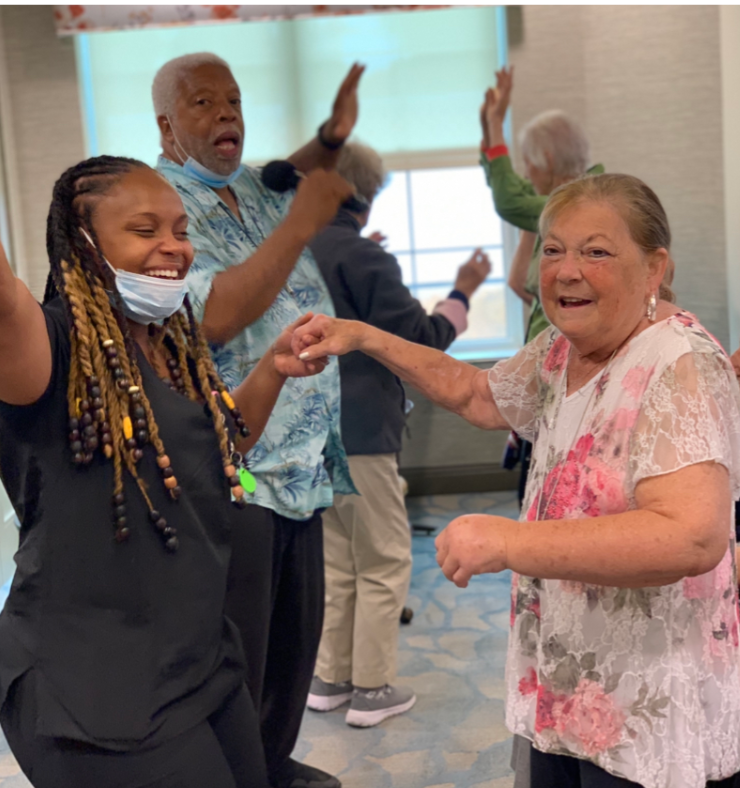
If your loved one isn’t able to complete daily tasks without significant support, needs help around the house, poses a safety risk to themselves, and/or continues to fall, they may need assisted living or nursing care.
When transitioning to memory care or other care communities (such as an assisted living or a nursing facility), we recommend the following tips from our checklist on moving to assisted living and memory care communities.
- Seek out help from loved ones in making the move. You don’t have to go at it alone.
- Do your best to maintain positive energy before, during, and after the move.
- Take pictures of your loved one’s home before you transition to the next chapter of living to have memories to look back on with fondness.
- Approach move-in day with sensitivity.
- Above all, remember to be patient with yourself and your loved one.
With dementia diagnoses on the rise across all adult age categories (Statista.com, 2020), the amount of senior care options will likely continue to increase over the next few years. The good news is that you’ll have plenty of help available when the time comes to care for you or your loved one with dementia.
Whether you feel your loved one needs to move — or whether you feel you just need a little extra respite care for your loved one — you’re always welcome to give us a call anytime for support in your caregiving journey.
Our senior concierge staff team has more than 20 years of dedicated experience providing care for seniors, supporting families who have loved ones with dementia, and mentoring caregivers in delivering quality, compassionate, and loving care.
Feel free to contact us anytime at (516) 271-2500 or at villagegreenlife@villagegreenseniorliving.com. Until then, we wish you all the best on the exciting journey ahead!
Village Green Memory Care: Joy, Comfort, and Community in Levittown, NY

